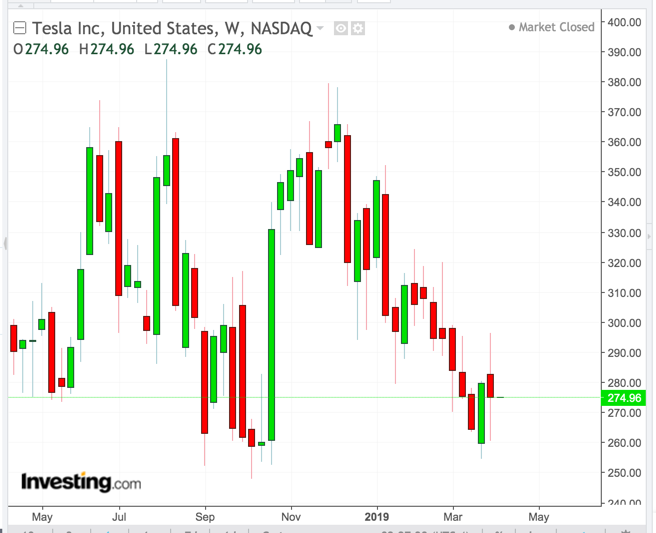
Tesla Inc. (NASDAQ:TSLA) seems to be caught in the grip of a never-ending negative news cycle. But the latest headlines are proving devastating for its stock. The electric car-maker's shares plunged as much as 11% in Thursday trading after the company announced a record decline in deliveries during the first quarter, making even its most ardent bulls nervous about its future growth prospects.
Tesla said last week it had delivered 63,000 vehicles in the three months that ended in March, down from 90,966 in the fourth quarter of 2018. Demand was hurt by reduced tax incentives in its home U.S. market, while the company struggled to get the cars to consumers in Europe and China. Model 3 deliveries totaled 50,900 vehicles, missing analysts’ average estimate for 51,750. This bad news also comes at a time when the CEO, Elon Musk, made the Model 3 the linchpin of his global growth strategy.
Deliveries for Tesla’s more expensive, older models, the S and X, presented an even more alarming demand picture for 2019. Sales of both fell by more than half compared with the prior quarter. Trading at $274.96 at Friday’s close, Tesla shares have lost about 5% of their value in the past week, and 18% since the start of 2019. This pullback demonstrates the nervousness of investors who now increasingly believe Tesla is making decisions on the fly and reacting to challenges without deep-thinking.
If you’re not following Tesla’s story as closely as we do, you might wonder what difference a miss of one quarter could make in the life of a car-maker with a promising product that's still in the early stage of its growth cycle. Why the drastic reaction from the market? The answer is that it confirms investors’ worst fears about the credibility of Tesla’s latest growth projections. If those growth assumptions were based on a too optimistic scenario, then investors have little reason to cling to Tesla stock, which has suffered many setbacks during the past one year.
The biggest was Musk’s botched attempt to take Tesla private which triggered a regulatory probe, resulting in a $40-million fine and Musk’s being barred from the company’s chairmanship. The U.S Securities and Exchange Commission (SEC) has taken Musk to the court after his Feb. 19 tweet over Tesla’s car production numbers that the regulator claims was misleading and violated his earlier settlement terms. In an order on Friday, a Manhattan court judge gave both sides until April 18 to reach a resolution. If they do not, the judge said she would decide whether to hold Musk in contempt.
Tesla’s bulls can still find some solace in this dismal situation though. The company, in its first-quarter output statement, confirmed its earlier projections of 360,000-400,000 vehicle deliveries in 2019, due to strong demand from Europe and China. In North America the Model 3 was yet again the best-selling mid-sized premium sedan, selling 60% more units than the runner up, according to Tesla statement.
We, however, find it quite difficult to be positive on Tesla’s shares and so do many leading Wall Street analysts. According to Joseph Spak of RBC Capital Markets, the slowdown in Model S and X deliveries will negatively impact Tesla’s first-quarter earnings and could potentially shave more than $1 billion off Tesla’s revenue estimates.
For us, the biggest concern is about Tesla’s management of its cash flows at a time when demand for its cars is falling and it needs to arrange money for maturing debt. Tesla had about $3.7 billion of cash and equivalents by the end of last quarter, but had to pay off a $920 million convertible bond in February. The carmaker has a $566 million note coming due in November, according to Bloomberg data.
Bottom Line
Tesla’s latest demand projections for its electric cars confirm our doubts about the company’s ability to remain profitable in 2019. With the company’s small cash reserves, its marketing strategy in trouble, and its CEO in a constant battle with the U.S. regulator, we don’t see Tesla shares stabilizing anytime soon. Investors should avoid taking a position in the stock when so much uncertainty has clouded the prospects of the company’s future growth.


0 Comments